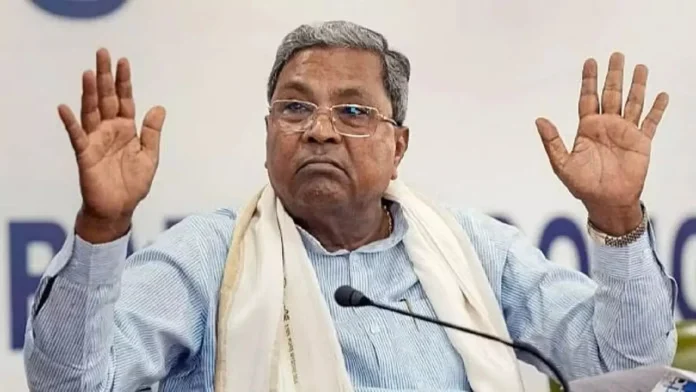Bengaluru: The Karnataka High Court on Tuesday upheld the sanction granted by Karnataka Governor Thawar Chand Gehlot to prosecute Chief Minister Siddaramaiah in the case related to MUDA scam.
The opposition leader KL Ashok and other BJP leaders have demanded resignation of the CM over the High Court Judgement. Meanwhile, the CM and Deputy CM DK Shivkumar have maintained their stand that it is only a permission to investigate. According to sources, the CM is likely to appeal before the Division Bench of the High Court.
Justice M Nagaprasanna dismissed the plea filed by Siddaramaiah challenging the sanction granted by Karnataka Governor to three people to file corruption cases against him over land that the Mysore Urban Development Authority (MUDA) granted to his wife Parvathi.
“The complainants were justified in pursuing the complaint and seeking approval at the hands of the Governor. The Court also held that private complainants can seek such sanction from the Governor and it is not necessary that a police officer should do the same.
“The approval under 17A is mandatory in the fact situation. It nowhere requires a police officer to seek approval in a private complainant under 200 or 223 of BNSS. It is the duty of the complainants to seek such approval,” the Court said.
“The Governor under normal circumstances has to act on the aid and advice of the Council of Ministers as under Article 163 of the constitution but can take independent decisions if exceptional circumstances arise. The present case projects one such exception. No fault can be found with the Governor exercising independent discretion to pass the impugned order. It would suffice if the reasons are recorded in the files of the decision making authority, particularly, of the high office. And those reasons succinctly form a part of the impugned order. A caveat, reasons must be filed. Reasons for the first time can’t be brought on record before the Court in the form of objections. The gubernatorial order nowhere suffers from want of application of mind. It is not a case of nowhere even a semblance of application of mind but abundance of application of mind. Grant of a hearing before approval under Section 17A is not mandatory. If the authority chooses to do so, it is open to it. The decision taken by the Governor of alleged hot haste has not vitiated the order. The order is read to be restrictive to an approval under Section 17A of the Act. The facts narrated in the petition would undoubtedly require an investigation. In the teeth of the fact, the beneficiary of all these actions is not anybody outside, but is the family of the petitioner. The petition stands dismissed,” the High Court said.
Siddaramaiah’s counsel requested the Court to stay the order for two weeks to enable the CM to file an appeal but the same was turned down.
“I can’t stay my own order. Any interim relief subsisting shall stand dissolved,” the single-judge said.
The sanction was granted on July 26 this year following private complaints made by activists TJ Abraham, Snehamai Krishna and Pradeep Kumar SP.
Case History
As per the complaint, Siddaramaiah’s wife Parvathi was ‘gifted’ a land plot measuring a little over three acres by her brother Mallikarjuna Swamy. Such land was initially acquired, then de-notified, and bought by Swamy. It was developed by MUDA even as private individuals owned it.
Swamy claims to have bought the land in 2004 and gifted it to his sister. But since the land was illegally developed by MUDA, Parvathi sought compensation. She allegedly received highly inflated compensation, including 14 developed alternate plots of land that were much higher in value than the original three acres, under the 50:50 scheme.
When MUDA was unable to acquire land at a break-even price, it used to hand over a portion of the developed land to the person from whom it was acquired. Initially, it was 60 percent of the developed land for MUDA and 40 percent to the owner of the land. Subsequently, it became 50:50.
Siddaramaiah has maintained that these decisions to compensate his wife were taken by MUDA independently without his interference or influence.
He has also alleged that the Governor’s sanction under Section 17A of the Prevention of Corruption Act to prosecute him was mala-fide and taken without any application of mind.
Senior Counsel Abhishek Manu Singhvi, who appeared for the Chief Minister, had argued among other things that the Governor failed to apply his mind to his August 16 sanction order. The Governor also showed “unusual urgency” in granting the sanction but at the same time took nearly three years to reject a similar sanction for an investigation into former BJP minister Shashikala Jole, Singhvi had told the Court.
Solicitor General Tushar Mehta, who appeared for the Governor’s office, argued that Gehlot had issued such sanction after noting that there existed prima facie material for investigation in the matter. He had also said that the Governor had decided to act independently, without relying on the advice of the Council of Ministers, because the latter had simply copy-pasted the State’s brief and advised him against issuing the sanction.
The lawyers for the three complainants, Pradeep Kumar SP, TJ Abraham, and Snehamayi Krishna, argued that the sanction under Section 17A of the Prevention of Corruption Act was legally valid since it merely allowed for the start of a probe into whether the CM can be linked to the alleged land allotments to his wife that are under question.




